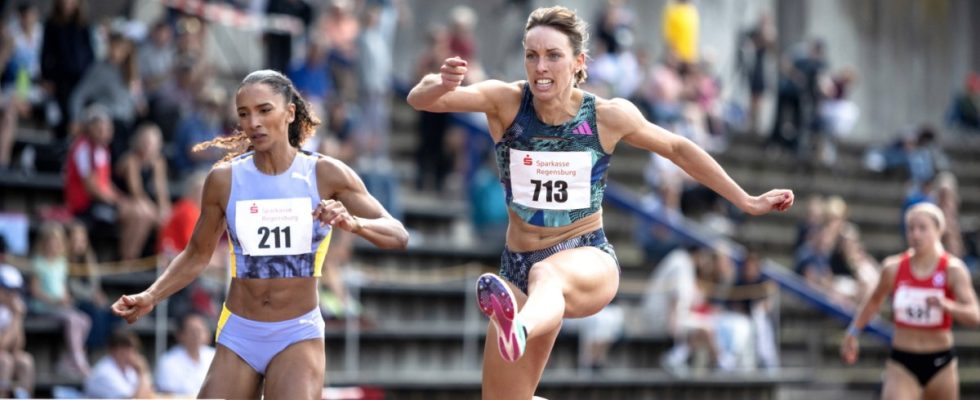Carolina Krafzik says the nervousness was noticeable, it was also unusual after the long break, you have to cope with that first: jumping over banana boxes as a primary school student, which Krafzik holds as a sports teacher in Baden-Württemberg.
The obstacles that the 400-meter hurdler Carolina Krafzik glided over again this season didn’t go so bad either: 55.35 seconds at the start in Basel, 54.89 seconds last in Regensburg, that was one of the Eye-catcher of the meeting (next to Manuel Sanders 45.36 seconds over the 400 meters). Krafzik was only twice faster than at the Sparkasse Gala: at the 2021 Olympic Games in Tokyo and last year, in the run-up to the European Championships in Munich (54.32), where she tripped in the final before the last hurdle, the momentum fizzled out and with it the medal. All in all, very reasonable prospects for the World Championships in August, and candidates with such ambitions also need them in the German Athletics Association (DLV), after the flop a year ago at the World Championships in Eugene.
Even then, after Eugene, there was often talk of how “semi-professionals” (sprinter Gina Lückenkemper) in Germany are often dependent on studies or a job; that one can hardly be pursued seriously without letting the other slide. Carolina Krafzik, 28, from Niefern near Pforzheim is an exception, she combines several aspects: how all the wheels mesh in the labyrinthine German top-class sport and how the future of this high-performance company is looking. Because Krafzik has the future in front of him week after week, between the banana crates in the physical education class at her elementary school.
If training doesn’t go well, Krafzik hardly has time to get upset – she has to prepare lessons
Since September 2021, shortly after the Tokyo Summer Games, Krafzik has been a part-time teacher, half-duty, no responsibility as a class teacher. This construct from the Ministry of Education in Baden-Württemberg is called “Top Sports Office”; Athletes should advance their careers in this way, but they should also be able to spend two weeks in a training camp without consuming their vacation (one or the other primary school teacher in the DLV from other federal states may look at the country a little enviously).
Krafzik says none of this can be taken for granted: that a federal state creates such opportunities; that it also fits into her life plan, the training group at VfL Sindelfingen around Werner Späth, who over the years has repeatedly led athletes from the provinces to the top of the world. Today? Do you feel “sooo good” in your dual sports life. If the training doesn’t go well, she hardly has time to get upset, because she has to prepare the lessons for the next day. This, in turn, provides serenity for the sport. At school, she was sometimes told that she was going through the curriculum with an emphasis on performance, just like in sports – Krafzik thinks that, too, brings her back from her top sports bubble. And if this bursts at some point, she doesn’t have to think about how things should go on in real life.
That always reassured her, says Krafzik: that top performance is possible without putting everything on one card.
In Paris she wants to advance to the Olympic finals – a new best time is probably necessary for this
Krafzik would not claim that everything is rosy in her teaching world either. Physical education teachers who advance to an Olympic semi-final in Tokyo and show the children how to slide over a hurdle – that is of course the exception. However, Krafzik quickly became acquainted with the norm in elementary school sports: that a non-specialist teacher holds physical education lessons if they are not cancelled. In any case, it is not a steep thesis that this is one of the reasons why there are ever larger gaps in German youth sports, in athletics and in general.
The Corona period, Krafzik thinks, has “unfortunately turned that into a negative again”. Her rector was very keen to continue physical education. But: “In many schools, physical education was simply not taught for two years because it was not staffed or the motivation was not there.” The third-class students, who are now in charge of them, have recently experienced two years without school sports, “there’s just a lack of experience,” says Krafzik, box jumping, trampoline jumping, everywhere: “But that’s exactly the age when you get a lot develops basic motor skills.” Freely translated: Now or never.
At some point Krafzik will get down to this work, but that time has not yet come. She had already met the norm for the World Cup in Budapest this year in Munich last year. For the 2024 Olympics in Paris – it would be their second games – the qualification window will open next July. The time limit is 54.85 seconds, which Krafzik almost achieved in Regensburg. For the final in Paris, their coach Werner Späth believes they would have to undercut the 54 seconds – a big obstacle, but that’s where Krafzik’s dual career comes into play again: don’t rush things, step by step, hurdle by hurdle.
From June 23rd, the European Team Championships will be held in Kraków, then the national championships in Kassel, and above all: the national youth games with the primary school. In any case, the training, says Krafzik, will not fail her students.

